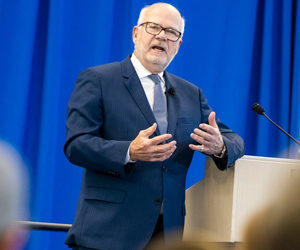Legendary broadcaster urges people to strive for the truth
By Lethbridge Herald on February 20, 2020.
 Canadian broadcast journalist Peter Mansbridge answers a question from the audience following a keynote address at the South Western Alberta Teachers’ Convention Thursday at the University of Lethbridge. Herald photo by Ian Martens @IMartensHerald
Canadian broadcast journalist Peter Mansbridge answers a question from the audience following a keynote address at the South Western Alberta Teachers’ Convention Thursday at the University of Lethbridge. Herald photo by Ian Martens @IMartensHeraldTim Kalinowski
Lethbridge Herald
tkalinowski@lethbridgeherald.com
Legendary broadcast journalist Peter Mansbridge gave the keynote address at the South Western Alberta Teachers’ Convention Association Thursday morning at the University of Lethbridge, and had an important message about striving for truth in an era of confusion, distortion and conflict.
“Try to understand some of these issues which confront us with some of the mixed messages we get from all sides,” he told attendees at the convention, referencing the recent Wet’suwet’en conflict as the latest in series of conflicts with First Nations he has witnessed over the course of his long career. “In some fashion trying to get to the truth of these issues, what’s being asked for? What’s needed? What’s misunderstood? For the average Canadian, you ask them what’s the difference between a hereditary chief and non-hereditary chief and they don’t know what the hell you are talking about. Nor do most government leaders, I would suggest.”
“We’re all kind of getting a crash course on that right now, or we should be,” he added. “It may be an over-simplification, but it might be the start of that (reconciliation) path. You have got to understand the truth about the situation before you can find a way forward.”
Mansbridge spoke for about an hour and a half on a series of contemporary topics confronting educators and students today, while bringing in reminiscences from his 40 years in broadcast journalism.
Even in an era of distortions and outright lies, Mansbridge affirmed his belief in the idea of objective truth and encouraged journalists, particularly, to continue to uphold that value even when others speak falsehoods.
“We respond by calling out lies or falsehoods, and reporting the truth on the areas we are covering,” he said. “There is this assumption it is only the president of the United States who stretches the truth — that’s putting the best possible description. But it’s not. It’s a lot of others, too, whether they are political leaders or business leaders or academic leaders; community leaders. When it appears you can get away with stretching the truth, then a lot of people try. Journalism is kind of one of those barriers to prevent that from happening. The more we do our job, the easier it will be to ensure that doesn’t happen.”
Follow @TimKalHerald on Twitter
-1




